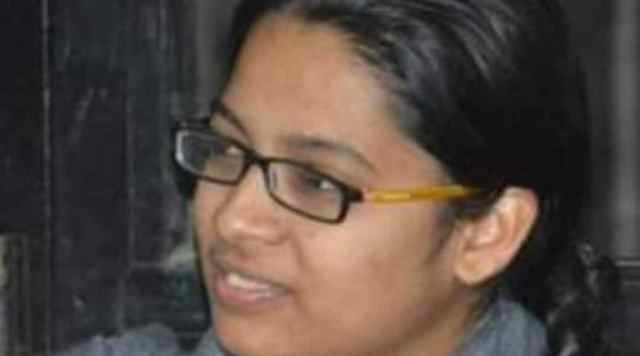Activist Harshali Potdar, who is among the organisers of the Elgaar Parishad, was questioned Sunday on the history of battle of Koregaon Bhima of January 1, 1818, during her cross examination before the Koregaon Bhima Commission of Inquiry.
The two-member commission, headed by retired high court judge justice J N Patel, was constituted by the government to probe into the causes that led to the violence in Koregaon Bhima area on January 1, 2018, leaving one person dead and several others injured.

A day before the violence, Elgaar Parishad had held a conclave at Shaniwar Wada in Pune on December 31, 2017, to commemorate the 200th anniversary of the battle of Koregaon Bhima.
The commission gave a soft copy of a book “Rulers of India Mountstuart Elphinstone”, published by Oxford at the Clarendon Press in 1892, to Potdar.
Elphinstone was a senior British government officer in 18th century.
Justice Patel said the book gives information about the battle, asking Potdar to read it as “the commission would like to know her views” in context of the battle of Koregaon. Potdar replied that she would require some time to study the book.
As per a narrative by members of the Dalit community, a British Army comprising 500 soldiers from the Dalit Mahar community defeated a 28,000-strong force of Peshwas, who were Brahmins, in this battle. Lakhs of people, mainly from the Ambedkarite Mahar community, visit the Jaystambh on January 1 calling it “Shaurya Din (victory day)” to pay tribute to the soldiers who, they believe, fought a war for freedom against the alleged casteism of the Peshwas.
Story continues below this ad
Elgaar Parishad too had largely followed this narrative. A committee — “Bhima Koregaon Shauryadin Prerna Abhiyan” — which organised the Elgaar Parishad had published a booklet, titled “Bhima Koregaon Ne Dilaya Dhada Navi Peshwai Masanath Gada”, before the conclave. Potdar said the title denotes “The battle of Bhima Koregaon gave us a lesson on how to bury the Navi Peshwai.”
Lawyers Rohan Jamadar and Pradeep Gavade, representing private parties who have filed affidavits before the commission, claimed that false history about the battle was propagated in this booklet, which was circulated in large numbers.
Jamadar claimed that no contemporary records were referred to in support of the battle history published in the booklet. Refuting this, Potdar said the book was based on contemporary sources. Potdar further stated she “challenges the very basis of the notion of contemporary sources” and would provide “enough material to support” her contention.
Jamadar is a descendant of a British soldier Kandojibin Gajoji Jamadar, who was injured in the battle of Koregaon Bhima in 1818. The British government had appointed Kandojibin as “in-charge” of the Jaystambh, a war monument it erected in 1821 in the memory of its soldiers who fought this battle.
Story continues below this ad
According to the Jamadar family, belonging to the Maratha community, both British and Peshwa forces consisted of soldiers from different castes. And thus, they say, the battle of Koregaon Bhima cannot be linked to any particular caste or religion, adding it was not a war against casteism.
Advocate Jamadar confronted Potdar with literature about “Poona Horse”, a battalion formed by Britishers in 1817, which had taken part in the 1818 battle of Koregaon Bhima.
As per this literature, at the time of raising of the Poona Horse, the British authorities gave specific directions that “The men to be Sunis, Shaikhs, Moguls, Pathans, Scindians (Sindhis), Beloochis, Shiahs, Hindustanis, Brahmins, Rajputs, and Maratta spearsmen – men of low caste not to be admitted….”
Advocate Gavade confronted Potdar with a British document dated 22 November, 1824. He claimed that as per this document, British authorities had decided not to appoint a soldier from “Purvarree (Mahar)” caste as Jaystambh in-charge.
Story continues below this ad
Gawade and Jamadar claimed that the British followed caste bias while recruiting soldiers and appointing Jaystambh in-charge. Potdar replied she would check these documents and revert.
Police investigation claims that Elgaar Parishad was organised according to the strategy of the banned CPI-Maoist and that speeches delivered at the conclave and previous campaigns for the event were among the factors that caused the violence.
Potdar questioned on connections with PFI-linked outfit
During her cross examination, advocate Gavade questioned Potdar about some of the organisations including the Popular Front of India (PFI) and Kabir Kala Manch (KKM) that had allegedly participated in the Elgaar Parishad.
PFI was banned along with its associated outfits like the National Confederation of Human Rights Organisation (NCHRO) in September 2022. Replying to Gavade, Potdar said she was a “secretary” of the NCHRO before it was banned. A Lok Sabha document, dated February 18, 2014, listing KKM among the front organisations of the banned CPI-Maoist, was submitted to the commission. Gavade claimed that “Elgaar Parishad was not organised by the Ambedkarites, Progressives, Constitutionalists and Rationalists Organisations”, but by “frontal organizations of CPI Maoist, Fundamentalist Organization like PFI” and “Violent and Casteist” outfits. Potdar denied the allegations.









